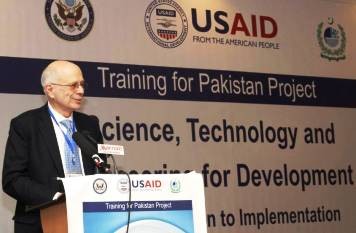Home » News & Information » Press Releases » U.S. to Foster S&T Cooperation to Help Pakistan Embrace Technology-driven Economic Growth

the U.S. Secretary of State Dr. E. William Colglazier while addressing the participants at the conference
USAID Pakistan
For Immediate Release
Tuesday, June 3, 2014
The United States today resolved to further its cooperation with Pakistan in science and technology by promoting the commercialization of scientific and engineering research in the country. Collaborative efforts in this direction will assist Pakistan in making its economy more competitive, dynamic, and driven by technology and innovation.
At a day-long "Science, Technology, and Engineering for Development: From Innovation to Implementation" conference, jointly convened by the U.S. Embassy, U.S. Agency for International Development (USAID), U.S. National Academies of Science, and the Higher Education Commission (HEC), officials from both countries praised ongoing U.S.-Pakistan science and technology cooperation. The conference, which focuses on how science, technology, and engineering can support development in Pakistan, was inaugurated by the Science and Technology Advisor to the U.S. Secretary of State Dr. E. William Colglazier, alongside Minister of Planning, Development, and Reforms Ahsan Iqbal, U.S. Science Envoy Dr. Bernard Amadei, and Pakistan's Higher Education Commission (HEC) Chairman Dr. Mukhtar.
Highlighting the importance of science and technology to the U.S-Pakistan Strategic Dialogue, Dr. Colglazier stressed the need to further boost U.S.-Pakistan science and technology cooperation, and informed participants that through the recently renewed Science and Technology Cooperation Agreement, institutions like the U.S. National Academies of Science and HEC continue to execute a joint research program that has awarded over $30 million to 88 projects over the past ten years. Dr. Colglazier added that, "Of 50 young scientists and engineers at the workshop, ten have already started companies and twenty more plan to do so. It gives me great faith to talk with these young people who want to contribute to their country and the economy. We are proud of our partnership with Pakistan in science and technology that has gone on for over ten years."
Minister Iqbal challenged the participants to play a greater role in contributing to Pakistan's economic growth and development. He said that, "The link between our knowledge platform and production platform is not connected. The United States has a much better capacity to commercialize technology. It is the job of engineers to give shape to their ideas for the benefit of the people. In today's world, innovation is critical for any business, for any society."
Greg Gottlieb, Mission Director for USAID in Pakistan noted that the urgency for an economy driven by science and technology has never been greater. "This conference embodies the spirit of what USAID have been trying to achieve using technology, education and innovation to address the development issues confronting Pakistan. My expectation is that the action plan produced at the four day workshop will be an important milestone on the road to transforming Pakistan into a competitive and dynamic economy," said Gottlieb.
The conference gathered experts from around the country to showcase the results of collaborative research projects. Panelists discussed how higher education institutions can generate an entrepreneurial culture with direct connections to Pakistan's private-sector businesses. A group of successful women scientists and entrepreneurs shared their experiences and encouraged other women to study these disciplines. Ms. Nagin Cox from the National Aeronautics and Space Administration's Jet Propulsion Laboratory in Pasadena, California talked about her experience on the Mars Rover team.
This is the second U.S.-Pakistan science and technology conference designed to promote the commercialization of scientific and engineering research. This year, the conference focuses on how science, technology, and engineering can support development in Pakistan. The conference marks the third visit of the U.S. Science Envoy to Pakistan, Dr. Amadei, who is Professor of Civil Engineering at the University of Colorado at Boulder. He is also the Founding President of Engineers Without Borders - USA and the co-founder of the Engineers Without Borders-International network.
Dr. Colglazier is the fourth Science and Technology Advisor to the U.S. Secretary of State. His office provides advice and technical expertise in support of U.S. foreign policy. He earned his Ph.D. in theoretical physics from the California Institute of Technology, worked at the Stanford Linear Accelerator, and was a professor of physics at the University of Tennessee. Since the early 1990s, Dr. Colglazier has worked at the National Academies of Science (NAS) and the National Research Council (NRC).







Comment
Make a general inquiry or suggest an improvement.